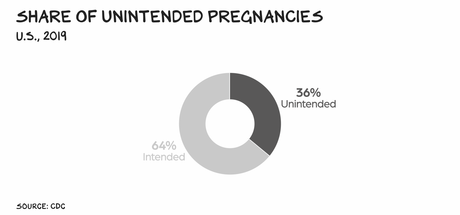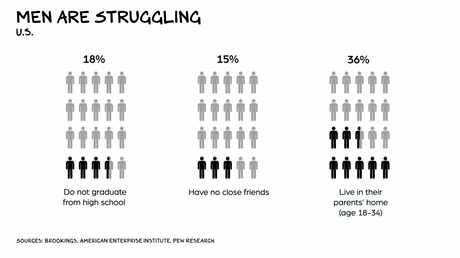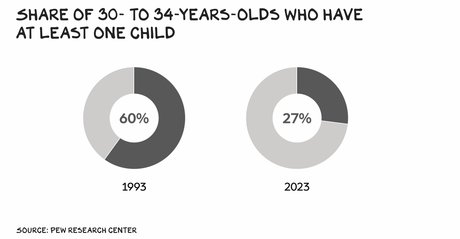Florida is now one of the most restrictive states in the country for abortion rights: The state's supreme court reversed its own precedents on April 1 and upheld a ban on abortions after six weeks. Women in Florida, as in many states after the reversal of Roe v. Wade, now face harsh limits on their fundamental rights.
The same day, the court also allowed a proposal enshrining abortion rights in Florida's constitution to appear on the ballot this November. There is a good chance it will pass, but it will be close - 60% will have to approve the amendment, and last fall, a poll found 62% of voters planned to vote for it. Nationwide, between 60% and 80% of Americans support a woman's right to choose, depending on how the question is asked. The rest of the world is expanding the right of women to decide when and how they get pregnant and give birth. Yet in many states, a minority of Americans continue to impose their views on the rest of us. I say "us" because while this right is unique to women, it affects all of us. The right to terminate an unwanted pregnancy changed the course of my life, and my mother's, even though I didn't understand it at the time.
__________________________
An earlier version of this post was originally published on October 12, 2018."D and What?"
On a late summer afternoon, between my junior and senior years of high school, I was in the passenger seat of my mom's lime-green Opel Manta on the way home from work. Mom had secured me a job in the mailroom of her employer, the Southwestern School of Law, where she managed the secretarial pool, and we carpooled back and forth. Headed west on I-10 (the Santa Monica Freeway), between the La Brea and Fairfax exits, she told me about her plans for later in the week.
"I'm having a procedure called a D&C on Wednesday and won't be home that night. Are you fine to stay alone?"
I was 16, and only really heard the part of her question suggesting I wasn't old enough to spend the night solo in our condo. "Yeah, sure." I didn't ask what a D&C was, but I had the sense it had something to do with the great unknown, women's health, and didn't ask for details. My mom likely wanted to have a meaningful conversation with me, but that didn't happen. Meaningful dialogue with teenage boys happens ... just not when you expect. The question must have found some purchase in my consciousness, as I remember exactly what I was wearing: brown Levi's corduroys, a Bruce Springsteen concert T-shirt, and top-siders. Not Sperry top-siders, but knockoffs. A pair of real Sperrys cost $32.
I was 16, my mom 46. I loved her because she loved me, completely. But that's not what this post is about. I also loved the U.S. because it, too, loved us - me and my mom - completely. My mother was a single immigrant raising her son on a secretary's salary. But this isn't a sob story. We had good lives. Sure, money was definitely a thing, but we lived in a nice place and took vacations to Niagara Falls and San Francisco, ate at Junior's Deli every Sunday night, and went some weekends to the beach in Santa Monica, where parking was $2 for the whole day, just behind lifeguard station No. 9.
Our nation welcomed my mother with open arms. Despite her having no education or money, we helped her out in between jobs and loaned her money so she could go to night school and become a stenographer. The state of California loved her son: The vision and generosity of the regents of UCLA and California's taxpayers gave her unremarkable son (this isn't a humblebrag, I was seriously unimpressive) a remarkable opportunity. I received a world-class education at little cost: UCLA (my B.A.) and UC Berkeley (an MBA) for a total cost (tuition) of $7,000 for all seven years.
More than just affordable, it was accessible: UCLA had a 76% admissions rate when I applied, and Berkeley's Haas School of Business accepted me with an undergraduate GPA of (no joke) 2.27. America is about the opportunities it provides the unremarkable, not the manufacture of a superclass of billionaires from the pool of preordained remarkables.
But the ultimate expression of our nation's empathy and love for a single mother, in my view, was to grant, and protect, her domain over her reproductive system. In the U.S., 59% of women getting abortions are already moms. Twenty-four percent are Catholic, 17% mainline Protestant, 13% evangelical Protestant. Over a third of pregnancies in the U.S. are unintended.

Men and women create unwanted pregnancies. However, it's often men's lack of manhood that's behind abortions. Half of women seeking an abortion cite the lack of a reliable partner as a reason for their choice. In many cases the partner is abusive. Among all abortion patients, 95% report that abortion was a good choice - they remain relieved several months after the procedure. Violence toward women declines precipitously after an abortion, because they can break ties with their abusers. The leading cause of death for women who are pregnant or have just given birth, by a factor of 2x, is homicide.
Alt Control
What is going on here? In my view, it has nothing to do with "life," as the most staunch advocates of the "pro-life" movement are the first to advocate for cutting the child tax credit, executing criminals, or putting a pregnant woman in danger when a pregnancy becomes a health risk. Many argue that these folks are not obsessed with life, but birth. This also misses the mark - the same groups do not favor economic policies that would encourage people to have children. This is about control or, more specifically, retaking control and power back from women.
I write a lot about how far young men have fallen in America over the past several decades. Even more striking is the ascent of women, globally, over the same period. Women now outnumber men in tertiary education enrollment worldwide; and the number of women elected to parliamentary positions has doubled since 1990. Women's wealth is growing faster than overall wealth. A static feature of a modern economy is women outpacing men in education and income growth.

However, this has stirred the ghoul that haunts the world ... posing a greater threat to society than any autocrat or virus: extremism. The parabolic progress of women over the past several decades has inspired a gag reflex among the most conservative wings of many religions. The radical wings of Christian, Islamic, and Jewish sects have weaponized politics and blurred the lines between religion and legislation. In America, where there used to be a sharp distinction, as outlined in the Constitution, we've witnessed a first: the rollback of citizens' rights with the overturn of Roe.
The backlash among Christian nationalists has been speedballed by the other great threat: loneliness. Two-thirds of women under the age of 30 have a romantic partner vs. just one-third of men the same age. Men have fewer friends than they once did. Unfortunately, men's loneliness can turn toxic, as they have weaker social networks and consequent guardrails. Lonely young men are more prone to conspiracy theories, nationalism, and misogynistic content. In sum, they risk becoming shitty citizens. The most striking, and frightening, data re the abortion debate is the group that registers the least support for a women's right to choose: Gen Z men (age 12 to 27). Do you think this reflects their love for the unborn, or resentment of the living (women) ... who they feel shunned by? It's simple: Radicalized and lonely American men want uppity women to sit down.
The weapon of choice among these groups is economic warfare. To deny someone bodily autonomy is analogous to defunding them; they lose power. The Turnaway Study followed 1,000 women who sought abortions (some successfully, some not), compiling over 8,000 interviews over five years. The women in the study who were denied an abortion on average had higher debt and a greater risk of bankruptcy, and they were more likely to be in poverty years after giving birth.
2nd Order
How did you get to where you are now? People tell themselves a story that credits their character and grit for success, while blaming outside forces for their failures. But small twists of fate, errant decisions, and sheer randomness put you in this place, at this moment. I'm in tech because I fell in love with a woman and followed her to the Haas School of Business - I'd initially enrolled at the University of Texas. It's more likely, graduating in 1992 Austin, I would have ended up in the energy sector or back in banking vs. the clear and present choice of tech in (wait for it) Silicon Valley.
But going further back, if my mom, at 46, hadn't had access to affordable family planning, our lives would have been changed dramatically. Not only did we lack the funds or connections to figure it out (a rich friend who knew a doctor or the resources to travel far and have the procedure), but we also didn't have the confidence. Just as I didn't apply to out-of-state colleges - only rich kids did that. A lower-middle-class household headed by a single parent, neither remarkable, puts both of you on your heels instead of your toes.
If Roe v. Wade hadn't been the law of the land, things could have been much different for me and my mom. An unwanted child at 46 would have been financially ruinous for our household. There was no maternity leave for secretaries in the eighties. I likely would have done what my father and mother did when their families were in financial distress, and left school to help out. I wouldn't have enrolled at UCLA. Instead, I would have stayed in the job my father had secured for me after high school, installing shelving at $18/hour - a lot of money for us at the time.
Without my mom having that choice, there would have been no UCLA, no Berkeley grad school, no tech startups, no tens of millions in taxes paid, and ... fewer children. I have always been worried about money and did not especially want kids. There's no way I'd have opted for kids, later in life, if financially strained. We see evidence of this today, as a younger generation is having fewer children because they can't afford them. My mom's right to choose not to have a child she couldn't afford gave me the choice to have children I could. All unbeknownst to me, at 16 years of age.

America is a mix of opportunity and acceptance, each being a force multiplier for the other. The reversal of Roe is about extremists and people who feel shunned trying to recapture control from a group that's increasingly less suppliant to religion or men. The result is a lack of prosperity and a dangerous regression in the U.S., which used to illuminate a path forward for other nations. The suppression of abortion rights is yet another transfer of wealth from the poor to the rich - no child of a private equity partner is going to lose her right to choose. The economic assault against women, specifically poor women and their families, cripples opportunity and acceptance. It is wrong and un-American.
Life is so rich,

P.S. This week on the Prof G Pod I spoke with journalist Fareed Zakaria. My last conversation with Fareed is our most popular episode ever. Listen to the latest here.
P.P.S. Join Section's free Intro to AI lecture to get your hands dirty with generative AI. You'll learn prompting tips, use cases, and workflow audits in one hour.

